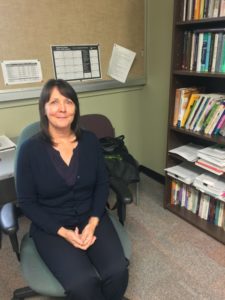Know Your Profs is an ongoing series of profiles on the instructors at Camosun College. Every issue we ask a different instructor at Camosun the same 10 questions in an attempt to get to know them better.
Do you have an instructor that you want to see interviewed in the paper? Maybe you want to know more about one of your teachers, but you’re too busy, or shy, to ask? Email editor@nexusnewspaper.com and we’ll add your instructor to our list of teachers to talk to.
This issue we talked to Camosun Psychology instructor Cate Pelling about being happy with small classes, struggling in post-secondary, and staying active on the weekends.
1. What do you teach and how long have you been at Camosun?
Psychology. 11 years.
2. What do you personally get out of teaching?
I get a great deal from teaching. I really enjoy the process of working with students as they engage with a subject area. At the start of term, students may feel confused or uncertain, but as they work through the term and gain mastery of the subject, their enthusiasm and excitement inspires me. I like to use an experiential approach to learning. I’m happiest when the room is full of small groups working on a problem or practicing a new skill.

3. What’s one thing you wish your students knew about you?
I struggled in my first two to three years of post-secondary. I didn’t know what I wanted to do with my life and I wasn’t interested in the courses that I was taking. I felt quite lost. It took me a few years to figure it out, but in the end my education provided me with work that I loved. I’ve been working a long time and I have never been bored with my work.
4. What’s one thing you wish they didn’t know about you?
I can’t think of anything.
5. What’s the best thing that has happened to you as a teacher here?
Quite often I hear from students who have moved on to other post-secondary institutions. When these students contact me and tell me that a course they took with me gave them a strong foundation for their current studies, I feel very gratified.
6. What’s the worst thing that’s happened to you as a teacher here?
Budget cuts.
7. What do you see in the future of post-secondary education?
I think the future of post-secondary education will involve increased integration of classroom learning with real-world experience. Currently, students have opportunities for applied learning through internships, co-ops, practicums, and apprenticeships. This trend will continue to grow and expand. I also think that we are coming to understand the importance of soft skills—which include people skills and emotional intelligence—in the workplace. In addition to academic or technical knowledge, successful future employees need to be well-versed in this skill set. Post-secondary institutions will need to respond to this demand.
8. What do you do to relax on weekends?
My son plays soccer, so I’m at the soccer field almost every weekend. I find this relaxing because I come from a family where everyone plays sports. A cup of strong coffee in the morning and the newspaper, cycling, hiking, taking the dog to the beach, going to the gym—a couple of these activities are part of every weekend too.
9. What is your favourite meal?
Almost any kind of seafood. Salmon is my favourite.
10. What is your biggest pet peeve?
Inconsiderateness.
